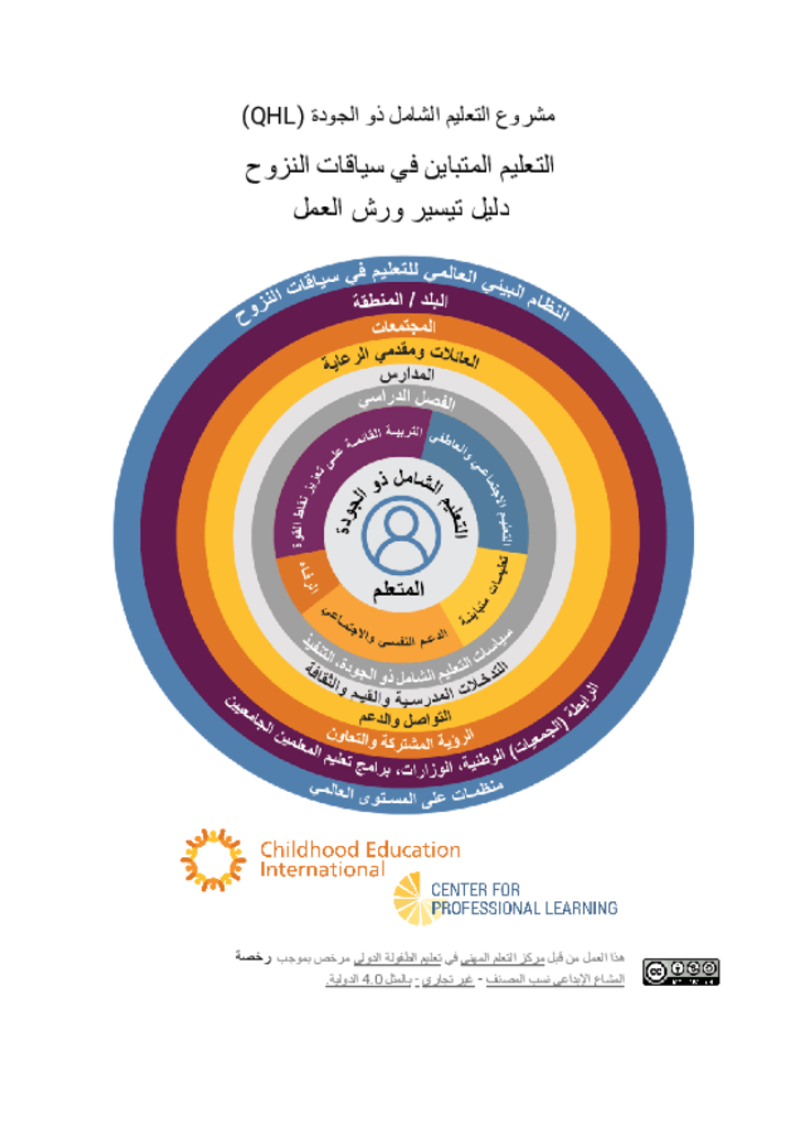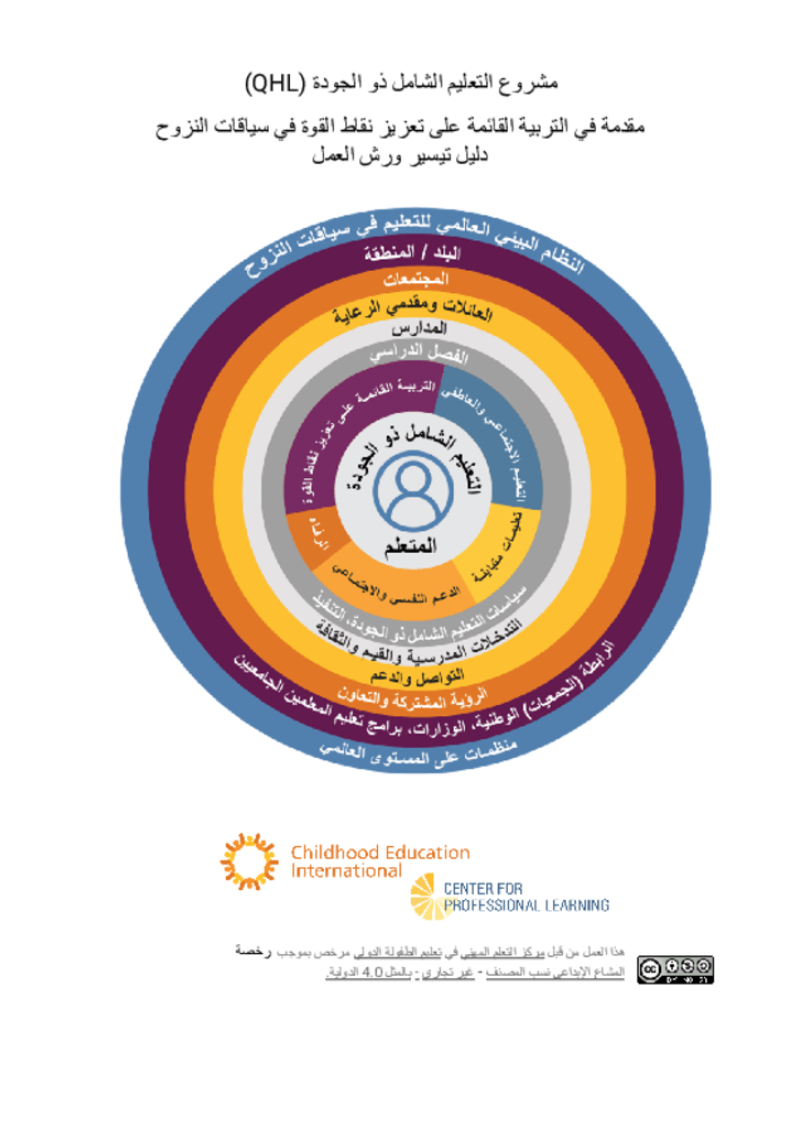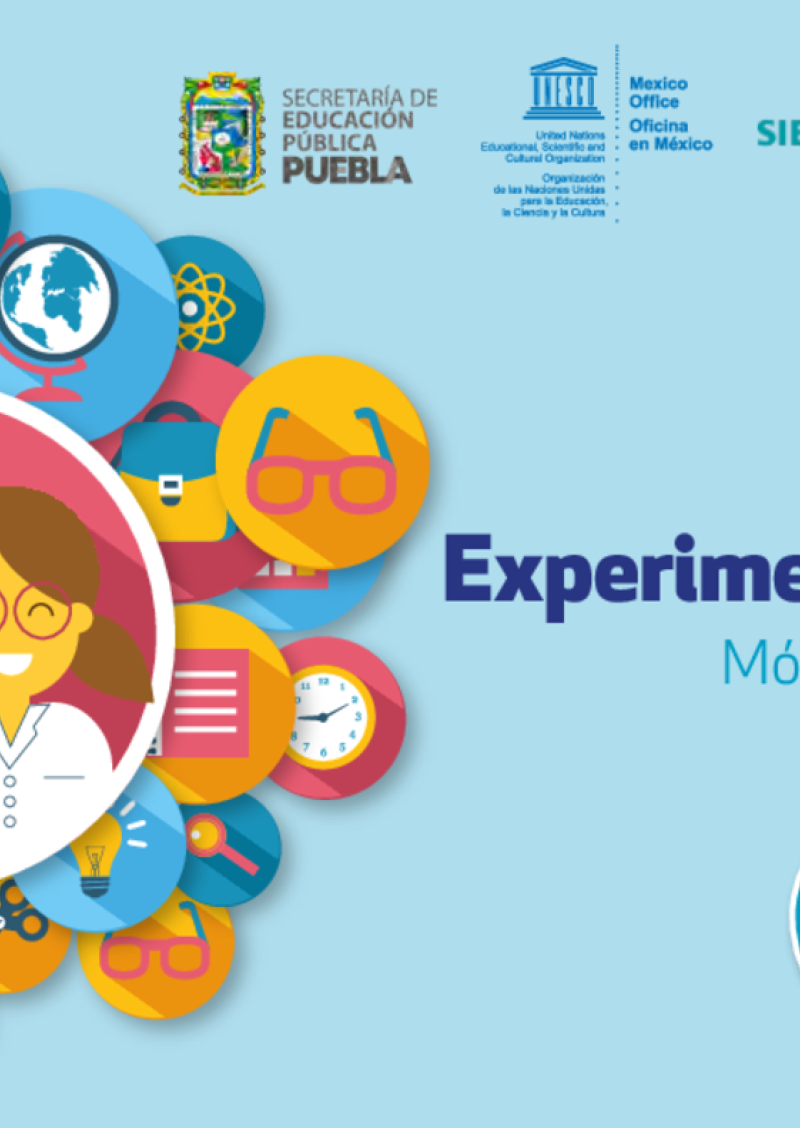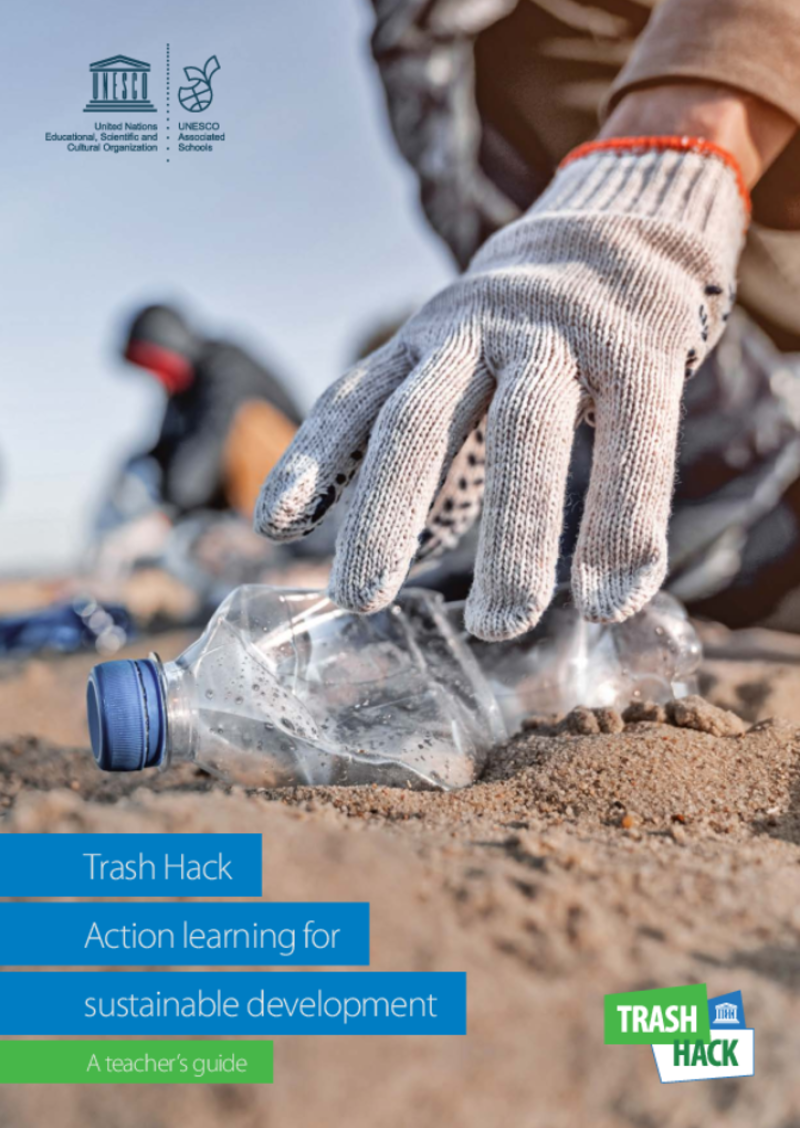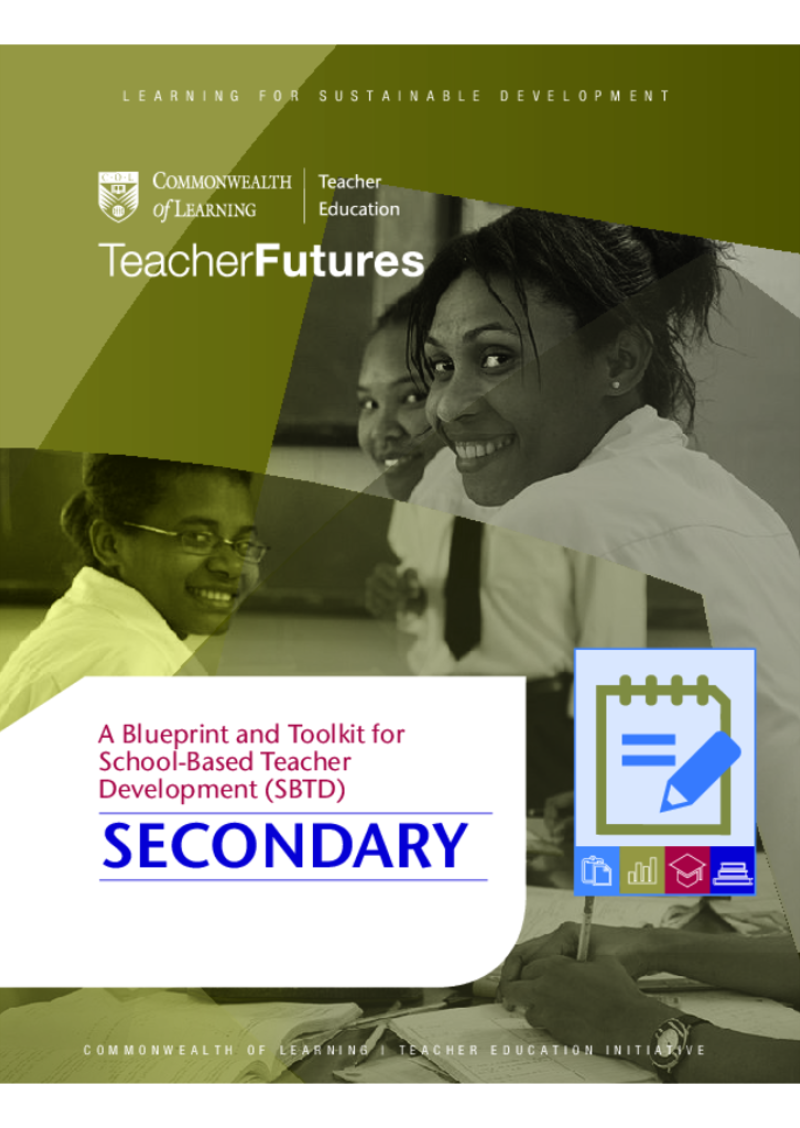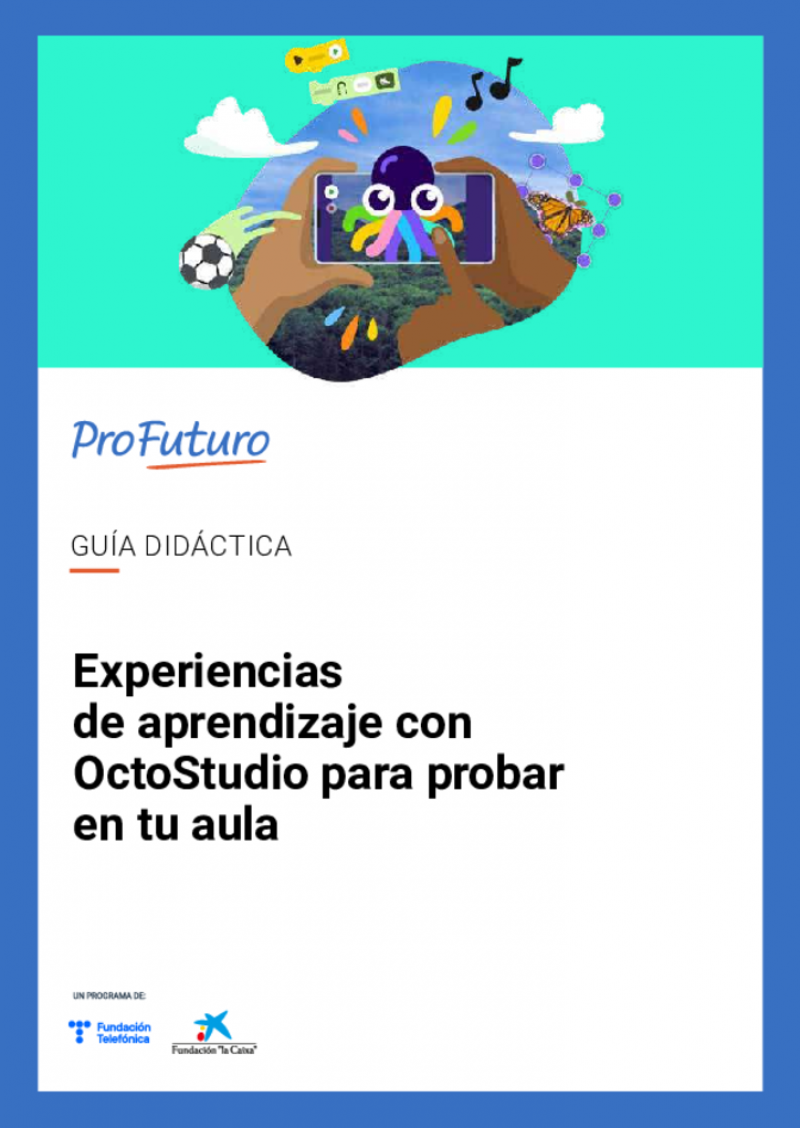مركز موارد المعلمين
عرض 1 - 20 من 32
التعليم المتباين في سياقات النزوح دليل تيسير ورش العمل
في هذا الدليل، هناك مطالبات لدعم استكشاف المحتوى والتطبيق على السياق المحلي. هناك أيضًا نصائح لدعم المعلمين أثناء توفيرهم للمساحة والوقت للتعلم المهني في حياتهم المزدحمة والمجهدة في كثير من الأحيان. أخيرًا، يقدم هذا الدليل بعض النصائح فيما يتعلق بالجوانب الإلكترونية و/أو الجوانب التكنولوجية الأخرى لهذا التدريب.
يهدف مشروع التعلم الشامل عالي الجودة (QHL)، والذي تعد ورشة العمل وجهًا لوجه أحد عناصره، إلى إعداد المعلمين لتقديم دروس عالية الجودة تدعم التعلم الشامل للأطفال والشباب من خلفيات متنوعة (اللاجئين والمهاجرين و/ أو المواطن) داخل البلد المضيف وسياقات النزوح والأزمات. إنهم يعرّفون التعلم الشامل عالي الجودة بأنه ذلك الذي يهتم بما يلي: ● التطوير الأكاديمي والمعرفي وتنمية الهوية، ● التعلم الاجتماعي والعاطفي، و ● الرفاه العقلي/النفسي الاجتماعي والجسدي والذي يوفر: ● تجارب مدرسية إيجابية، ● مشاعر الانتماء والانتماء السلامة، ● النمو والتطور، و ● نتائج عادلة لجميع المتعلمين.
مقدمة في التربية القائمة على تعزيز نقاط القوة في سياقات النزوح دليل تيسير ورش العمل
يهدف هذا الدليل إلى دعم تقديم مجموعة من أربع ورش عمل تمهيدية حول موضوع دعم التربية القائمة على تعزيز نقاط القوة في سياقات الأزمات من خلال تنفيذ أدوات وأنشطة التدريس القائم على تعزيز نقاط القوة ومن خلال الحفاظ على مساحات تعليمية آمنة ومأمونة.
ورش العمل هي نتيجة المساهمات الثاقبة لفريق ملتزم من المعلمين والمعلمين من كينيا ولبنان والنيجر.
أصول علم التّربيّة القائمة على تعزيز نقاط القوّة لتعلّم شامل عالي الجودة
تمّ تصميم هذه الدّورة التّدريبيّة المفتوحة - ذاتيّة الوتيرة، والمعتمدة على أصول التّربيّة القائمة على (نقاط القوّة)؛ للتّعلّم الشّامل عالي الجودة - من قِبَل المعلّمين لزملائهم، وخاصًّة أولئك الّذين يعملون مع المتعلّمين اللاجئين، والضّعفاء. والهدف منها هو تقديم لمحةٍ عامّةٍ عن المصطلحات، والمفاهيم، والممارسات الرّئيسة المتعلّقة بالأساليب التّربوية القائمة على (نقاط القوّة).
سيكون لدى المعلّمين الّذين يُكمِلون هذه الدّورة التّدريبيّة القصيرة عبر الإنترنت، القدرة على ما يلي:
- اكتساب فَهْم عمليّ لماهيّة (طبيعة) طرق التّربيّة القائمة على نقاط القوّة، وأسباب أهمّيتها.
- القدرة على تحديد الطّرق الّتي يمكن من خلالها تطبيق أساليب التّربية القائمة على نقاط القوّة في الفصل الدّراسيّ.
- التّأكد من إمكانيّة تطبيق أصول علم التّربيّة القائمة على نقاط القوّة في سياق عملهم.
سوف تستغرق من 3-4 ساعات، في المتوسط ، لإكمال هذه الدورة. وسيتمّ إصدار شهادة مشاركة عند الانتهاء بنجاح. شكرًا لك على اهتمامك والتزامك بالتّعلّم المهنيّ والتّعليم!
يجري حاليًّا تطوير دليلٍ؛ لاستخدامه في حال عدم توافر الإنترنيت، كأداةٍ موازيةٍ للتّعرّف على طرق التّربيّة القائمة على نقاط القوّة. يُرجَى الاتصال بـ jkasper@ceinternational1892.org ؛ لمناقشة تجربة هذه المادّة الإضافيّة
مُقدِّمة في التّعلّم الاجتماعيّ والعاطفيّ والدّعم النّفسيّ الاجتماعيّ من أجل التّعلّم الشّامل عالي الجودة
تم تطوير هذه الدورة التدريبية عبر الإنترنت ، والتي تُرجمت إلى اللغة العربية ، بناءً على مواد ورشة العمل المصممة بواسطة زملاء مشروع التعلم الشامل عالي الجودة
(QHL) في النيجر. يقدم هذا المساق التعلم الاجتماعي والعاطفي (SEL) ، والدعم النفسي الاجتماعي (PSS) ، وأماكن التعلم الآمنة والشاملة. هذا هو مصدر تعليمي ذاتي
(غير مُيسَّر). المواد المترجمة شبيهة جدًا بالنسخة الإنجليزية.
دمج التّعلّم العاطفي والدّعم النفسي الاجتماعي في دروس التّعلّم الشامل العالي الجودة
دمج التّعلّم العاطفيّ الاجتماعيّ SEL والدّعم النّفسيّ الاجتماعيّ PSS في دروس التّعلّم الشّامل عالي الجودة
تمّ تصميم هذه الدّورة التّدريبيّة المفتوحة - ذاتيّة الوتيرة، والّتي تقوم على دمج (PSS) و (SEL) في الدّروس من أجل التّعلّم الشّامل عالي الجودة - من قِبَل فريق من المعلّمين الّذين يعملون مع المتعلّمين اللاجئين، والضّعفاء في جميع أنحاء لبنان.
وتهدف إلى البناء على ما تمّ تعلّمه مسّبقًا فيما يتعلّق بالتّعلّم الاجتماعيّ والعاطفيّ (SEL)، والدّعم النّفسيّ الاجتماعيّ (PSS)، وذلك لتزويد المعلّمين بالثّقة؛ لتقييم الأنشطة بشكلٍ نقديّ، وتكييّفها مع سياقهم المحليّ، وتقييم مدى تأثيرها على تعلّم الطّلاب ورفاههم.
سيكون لدى المعلّمين الّذين يُكمِلون هذه الدّورة التّدريبيّة القدرة على:
- تحديد مفهوم (PSS) و (SEL).
- دمج (PSS) و (SEL) في خطط الدّروس.
- خلق مساحات آمنة للمتعلّمين النّازحين، واللاجئين، وغيرهم من الطّلاب الضّعفاء.
- التّفكير في الأدوات وطرق التّعليم عند تنفيذ أنشطة (PSS) و (SEL).
- تقييم تكيُّفها، ومدى قدرتها على تنفيذ أنشطة (PSS) و (SEL).
سوف تستغرق من 8-10 ساعة، في المتوسط ، لإكمال هذه الدورة.
Ciencias de la computación para el aula - Manual para docentes (Primer ciclo primaria)
Este recurso incluye secuencias didácticas con actividades para realizar con los alumnos, así como fichas imprimibles con ejercicios. También contiene todas las instrucciones necesarias para que el docente pueda acompañar a los alumnos en la realización de estas actividades. El objetivo de estos recursos es enseñar a niñas y niños el funcionamiento de los computadores y las tecnologías digitales. Si este recurso ha sido concebido específicamente para el sistema educativo argentino, también se puede adaptar a otros contextos educativos hispanófonos. Se realizaron manuales similares para secundo ciclo de primaria, y ciclo secundario, que se podrán encontrar en este enlace.
Experimento 3+ módulo: Salud - Guía de trabajo para docentes de preescolar
Esta guía, elaborada en el marco de un proyecto con la Oficina de la UNESCO en México para desarrollar la enseñanza de la ciencia a nivel preescolar, propone actividades y experiencias científicas para realizar en el aula. Incluye medidas de seguridad que se deben observar y demás instrucciones necesarias. Este módulo se centra en la temática de la salud (conocimiento del cuerpo humano, etc...).
Experimento 3+ módulo: Medio Ambiente - Guía de trabajo para docentes de preescolar
Esta guía, elaborada en el marco de un proyecto con la Oficina de la UNESCO en México para desarrollar la enseñanza de la ciencia a nivel preescolar, propone actividades y experiencias científicas para realizar en el aula. Incluye medidas de seguridad que se deben observar y demás instrucciones necesarias. Este módulo se centra en la temática del medio ambiente (ciclo del agua, contaminación, etc.…).
Experimento 3+ módulo: Energía - Guía de trabajo para docentes de preescolar
Esta guía, elaborada en el marco de un proyecto con la Oficina de la UNESCO en México para desarrollar la enseñanza de la ciencia a nivel preescolar, propone actividades y experiencias científicas para realizar en el aula. Incluye medidas de seguridad que se deben observar y demás instrucciones necesarias. Este módulo se centra en la temática de la energía (producción de energía, objetos conductores etc.…).
Global citizenship education in a digital age: teacher guidelines
This publication has been designed both for new and experienced teachers, as well as other professionals working in non-formal education settings that engage with upper primary and secondary students.
Purpose:
1.By using principles of GCED, digital citizenship, and media and information literacy, the guidelines aim to build the capacities of teachers to prepare learners to understand the implications of global and digital transformations on education, and to build opportunities to practice ethical and responsible behaviours in physical and digital environments. They provide guidance on tapping into the positive potential of the digital transformation, including through new access to information, possibilities of connection, and the creation of tailored content.
2. Build learners’ capacities to think critically about the influences and content that they encounter and engage in creating in physical and digital spaces.
3. Shape learners’ understanding of global challenges and how they can contribute to the Sustainable Development Goals (SDGs) through globally oriented digital citizenship.
Trash hack action learning for sustainable development: a teacher's guide
This short guide provides teachers with action-based approaches to address waste and trash management for sustainable development. It contains infographics and factsheets, inspiring initiatives taken by youth all around the world and activities that can be implemented in class or outside, over one day or several class sessions.
Media and information literate citizens: think critically, click wisely!
This pioneering curriculum presents a comprehensive competency framework of media and information literacy (MIL) and offers educators and learners structured pedagogical suggestions. It features various detailed modules covering the range of competencies needed to navigate today's communications ecosystem. This resource links media and information literacy to emerging issues, such as artificial intelligence, digital citizenship, education, education for sustainable development, cultural literacy, and the exponential rise in misinformation and disinformation. With effective use of this media and information literacy curriculum, everyone can become media and information literate as well as peer-educators of media and information literacy.
This UNESCO model MIL Curriculum and Competency Framework for Educators and Learners is intended to provide education systems in developed and developing countries with a framework to construct a programme enabling educators and learners to be media and information literate. UNESCO also envisions that educators will review the framework and take up the challenge of participating in the collective process of shaping and enriching the curriculum as a living document. The first edition and this second edition of the MIL curriculum have benefited from several series of collaborative and intercultural expert debates and recommendations. The curriculum focuses on required core competencies and skills which can be seamlessly integrated into the existing education system without putting too much of a strain on overloaded education curricula.
The target groups for the curriculum are essentially educators and learners. Educators and learners are understood in the broadest sense of the terms to include teachers at the secondary and primarily tertiary levels, persons involved in training or learning on all forms in NGOs, CSO, community centers, the media, libraries, online or offline. Given that the curriculum was developed with adaptation in mind, it can be used by various stakeholders interested in the field of MIL. Users may need to adapt the content to make it more relevant or accessible to specific target groups. The curriculum is also relevant to government officials and ministries, and other social and international development organizations.
Assistive Technologies: Inclusive Teaching Guidelines for Educators
Assistive technologies encompass tools and services designed to enhance learners' independence, participation, and success, helping them reach their full potential. This guide explains how educators can use assistive technology to create an inclusive environment that supports diverse learning styles and information processing. It introduces various assistive technologies that cater to individual learner needs, helping them overcome challenges. Educators should view assistive technologies as resources for all students, integrating them into the classroom to ensure widespread benefit and minimize the risk of stigmatization.
Blueprint and Toolkit for School-Based Teacher Development: Secondary
Created by Bob Moon, this Blueprint and Toolkit offers guidance and resources to support a 12–15 week program. It provides a detailed framework that can be tailored to suit the specific needs of a country, region, district, or school. Aimed at institutions looking to strengthen school-based teacher development (SBTD) to enhance school performance and improve student achievement, this resource is available as Open Educational Resources (OER), making it accessible to policymakers and those involved in implementing teacher development systems.
"Section 4: The Teacher Toolkit: Secondary" is organised around ten key questions. In responding to each question, you will find general commentary on the issues involved and activities that you can try out with your classes. There are also some descriptions of other teacher’s experiences to provide further guidance for you. The accompanying Key Resources should be used alongside the Blueprint and Toolkit when working through each question. The most relevant Key Resources in each case are listed at the beginning of each question.
Teaching and Learning with Living Heritage: A Resource Kit for Teachers
This resource kit includes several components that provide teachers with information on why and how to incorporate living heritage into their school based activities. It was developed as a result of the UNESCO–EU initiative on cultural heritage and education, under the European Year of Cultural Heritage in 2018, and it builds on projects across a variety of subjects developed by teacher from 10 countries.
Experiencias de aprendizaje con OctoStudio para probar en tu aula
Esta guía didáctica proporciona instrucciones detalladas sobre cómo descargar OctoStudio desde la web de ProFuturo, acompañadas de una introducción sobre cómo dar los primeros pasos en el uso de la aplicación. El objetivo principal es hacer que OctoStudio sea accesible para docentes de todos los niveles de experiencia tecnológica, facilitando así su implementación en entornos educativos diversos. OctoStudio es una aplicación desarrollada por el grupo Lifelong Kindergarten del MIT Media Lab que promete revolucionar la manera en que los educadores introducen la programación y el pensamiento computacional en las aulas.
Teaching to prevent atrocity crimes: a guide for teachers in Africa
This is UNESCO's first resource with a regional focus on teaching to prevent atrocity crimes. It was developed with the United Nations and in partnership with the UNESCO International Institute for Capacity Building in Africa (IICBA). The guide was informed by exchanges with African stakeholders and advisors and tested through a piloting exercise with African teachers and students. It provides principles for teachers to consider in facilitating learning and constructive discussions with their students.
